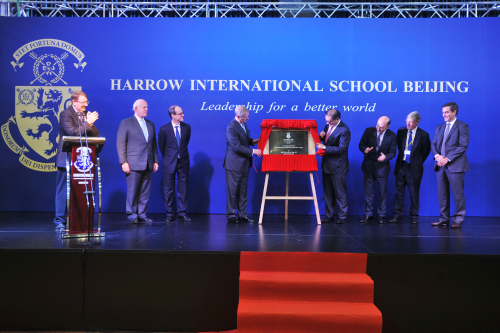 |
|
ROYAL SUPPORT: The Duke of York, Prince Andrew of Britain (fourth left), attends a celebration of the 10th anniversary of Harrow International School Beijing on October 24 (WEI YAO) |
A full choir, staged scenes from a musical drama, affluent teenage students of various nationalities and backgrounds. No, this isn't a scene from Gossip Girl, but the joint celebration of the opening of a new campus and the school's 10th anniversary at Harrow International School Beijing, the Beijing branch of the renowned British educational institution.
Alongside China's economic development, many private schools have set down roots in China. In Beijing, there are dozens of international schools giving lessons in English. In the meantime, the popularity of traditional Chinese private schools is also on the rise. These private schools typically charge high tuition fees, but this has not dissuaded many parents from sending their children to such institutions owing to various considerations.
Inside private schools
Harrow International School Beijing could justifiably be termed as one of the Chinese capital's "blue blood" international schools, built on the model of elite British public schools. Unlike their Chinese counterparts, England's public schools are in fact, somewhat confusingly, private schools which are open to the public but not government-owned. In its native Britain, Harrow School has a history stretching back 400 years with graduates such as the famous poet George Gordon Byron and Winston Churchill, Britain's much-revered prime minister who served office during World War II.
Established in 2005, Harrow International School Beijing is a full-time international school with a student population of 700 from 33 countries and regions, ranging from 2 to 18 years of age. The school has 104 teachers from Britain and other members of the Commonwealth of Nations. It rarely accepts pupils of Chinese nationality before the high school phase, except those from Hong Kong or Macao. The students of the Upper School (ages 13 to 18), Prep (ages 10 to 13) and Pre-Prep (ages 5 to 10) levels each enjoy their own distinct areas and facilities. The school has top-level sport, performing arts and study facilities as well as a pleasant environment in common with most international schools.
The British have long been proud of their education system. "Regarding British education, there is a slight difference to other forms of education given in English. There is an element of culture. That culture comes from years and years of experience in education. Harrow School in Britain has long experience in educating future leaders," said the Duke of York, Prince Andrew of Britain, in his speech on October 24 at Harrow International School Beijing.
Harrow International School Beijing is an archetypical British public school. Its academic structure is based on the house system, mostly familiar to non-Brits through the Harry Porter series of novels and movies. The students all wear the same uniform, but different ties, because the school is divided into six houses each distinguished by its own individual color. In a manner reminiscent of J. K. Rowling's stories, students in the same grade take classes together, while the six houses compete against each other in sports, games and other activities. Each house has several close personal tutors. "Every tutor takes care of 15 students of different ages during their time at school, and is very familiar with aspects of each student's situation such as their parents and skills," said Nicholas Rickford, Supervisor of the Yellow House.
